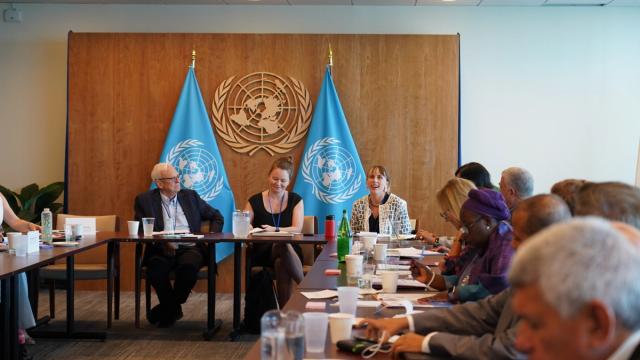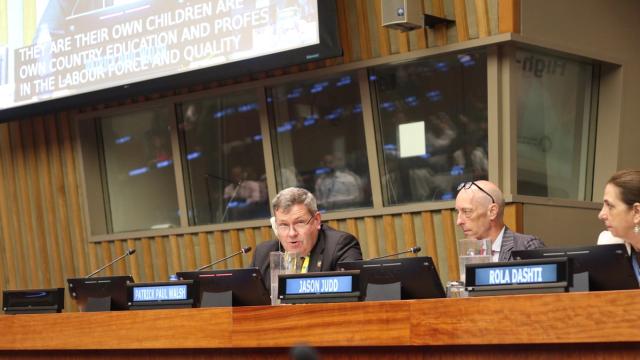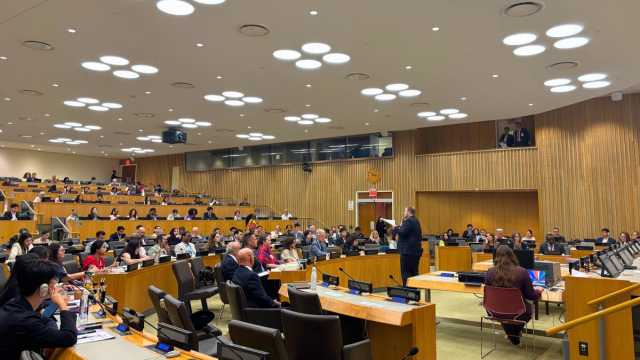SDSN at HLPF 2025: Connecting Science, Policy, and Partnerships
From July 14 to 23, 2025, the UN Sustainable Development Solutions Network (SDSN) participated in the UN High-Level Political Forum (HLPF) on Sustainable Development, the UN’s central platform for reviewing progress on the 2030 Agenda. The HLPF serves as a venue for assessing global progress, exchanging experiences, identifying gaps, and sharing lessons learned.
The SDSN’s Engagements at HLPF
Throughout the week, the SDSN and its partners hosted a series of events addressing a wide range of sustainable development challenges, including closing implementation gaps, accelerating the energy transition in the Global South, harnessing artificial intelligence, advancing higher education, and protecting the Amazonian ecosystem.
From Evidence to Impact: Strengthening Research, Policy, and Capacity Ecosystems
Organized by SDSN’s SDGs Today, the European Commission’s Joint Research Centre, and the Maldives Bureau of Statistics, this event highlighted the critical intersection of research, capacity building, and evidence-based policymaking for advancing sustainable development.
Speakers emphasized the urgent need for quality, accessible, timely, and disaggregated data to train locally applicable AI models, inform decision-making, and support responses to climate, health, and humanitarian crises. Discussions examined the interconnections between open data production, the research it enables, and its impact on timely, context-specific policy responses.
Participants explored how to strengthen the “tri-node” ecosystem of research, policy, and capacity building, drawing lessons from initiatives such as the Degree of Urbanisation, Data for Now, and the Early Warning for All initiative. The roundtable showcased practical geospatial, Earth observation, and AI solutions for SDG monitoring. A debate-style format invited diverse stakeholder perspectives on fostering collaboration, identifying shared priorities, and advancing evidence-based policy.
Watch the recording on YouTube.
Science Day 2025: Unlocking Tomorrow’s Solutions, Today
Science Day 2025 brought together leading scientists, policymakers, civil society representatives, and young leaders to explore how science can accelerate sustainable development and address gaps in SDG implementation.
Through case studies and a high-level panel, participants underscored the need to institutionalize transdisciplinary approaches, co-create knowledge with communities, and treat science communication as an essential component of research.
Case studies demonstrated how inclusive science-policy collaboration can address stalled SDG progress, foster equity, and build resilience. Discussions also examined the potential of AI as a diagnostic tool to identify synergies and gaps across SDG implementation, particularly in interconnected areas such as poverty, energy, healthcare, and climate action. Panelists called for improved accessibility and usability of scientific knowledge, recommending investments in communication training, removal of paywalls, and framing science communication as a two-way, participatory process.
Across all discussions, the call was clear: transdisciplinary approaches and inclusive communication must be embedded into science-policy interfaces to ensure progress toward the SDGs and beyond 2030.
Watch the recording on YouTube.
Globalizing Sustainability: Training for Green Jobs Through the Ages of Globalization
Inspired by Professor Jeffrey Sachs’ Ages of Globalization framework, this event focused on localizing the SDGs through green economies, youth-led volunteerism, artificial intelligence, and sufficiency-based practices. Organized by the Saudi Green Building Forum, Columbia University’s Center for Sustainable Development, and the SDSN, the session explored how global goals can be implemented locally, especially in vulnerable contexts.
Panelists demonstrated how AI and intergenerational knowledge can prepare future-ready workforces, strengthen resilience through nature-based and community-rooted approaches, and integrate green job training into SDG education frameworks. The discussion emphasized the role of volunteerism and cross-sector partnerships in aligning local pilot projects with national SDG implementation and Voluntary National Review (VNR) processes.
Watch the recording on YouTube.
Global Higher Education Symposium
The SDSN, in partnership with UN Academic Impact, the International Science Council (ISC), International Association of Universities, German Center for Research and Innovation New York (DWIH), York University (Canada), UNESCO, UNITAR, and the Higher Education Sustainability Initiative (HESI), convened academics, policymakers, and experts to reflect on the role of higher education in achieving the SDGs.
The symposium opened with remarks from UN Under-Secretary-General for Global Communications Melissa Fleming and ISC President-elect Robbert Dijkgraaf. Nudhara Yusuf, Executive Coordinator of the Global Governance Innovation Network, delivered the keynote, posing guiding questions on embedding resilience in institutions, people, and principles. Chaired by Noah Sobe of UNESCO and Helen Bond of SDSN USA, the panel discussions highlighted the need to further integrate higher education institutions into policymaking and to prioritize soft skill development such as emotional intelligence, negotiation, and creativity.
SDG 8 Engagements
The SDSN also contributed to the HLPF’s review of SDG 8 (Decent Work and Economic Growth). Patrick Paul Walsh, Director of the SDG Academy, served as a panelist at the 5th Meeting on SDG 8, and the SDSN co-organized the event “Accelerating SDG 8 Implementation” with the International Association of Universities (IAU), UN Academic Impact (UNAI) SDG Hub 8, University of Auckland, International Labour Organization (ILO), University College Dublin, University of Nigeria Nsukka and Makerere University.
Discussions centered on how academia can support policies and partnerships that provide decent work for all and promote sustainable economic growth.
Water and Health Connectivity in the Amazon: Challenges and Solutions
On July 23, the Science Panel for the Amazon (SPA), in partnership with the Permanent Mission of Colombia to the United Nations, hosted a high-level panel on Water and Health Connectivity in the Amazon. Held at the Colombian Mission, the event aligned with the HLPF’s review of SDGs 3 (Health), 14 (Life Below Water), and 17 (Partnerships). The Amazon was presented as a cornerstone of regional and global health and water security, with panelists drawing on SPA policy briefs to offer science-based recommendations for addressing socio-environmental challenges affecting its peoples and ecosystems.
Opening the session, Ambassador Raúl Esteban Sánchez Niño stressed the need for transboundary cooperation, regional dialogue, and respect for diverse perspectives to secure a healthy future for the Amazon. Moderator Emma Torres, SDSN Vice President for the Americas, led a discussion featuring Dr. Gloria Rivera on the region’s health challenges and the value of Indigenous knowledge; Dr. Sebastian Heilpern on the Amazon’s role as a vast freshwater ecosystem sustaining food, energy, and climate systems; and Dr. Erwin de Nys on World Bank initiatives connecting all eight Amazon countries to promote conservation, sustainable livelihoods, and cross-border governance.
Audience reflections reinforced the deep links between Amazonian health and water connectivity, viewed through a One Health lens. The discussion concluded with a call for sustained international partnerships to preserve the biome’s ecological connectivity and resilience.
Watch the recording on YouTube.
Advancing the Energy Transition in the Global South
The SDSN co-organized two events on advancing the energy transition in the Global South to achieve SDG 7 (Affordable and Clean Energy) and support sustainable economic growth. Co-organized with GEIDCO, CEET, UNDP, and the Permanent Mission of China to the United Nations, both sessions highlighted the need for inclusive, region-specific strategies that link the energy transition to industrial transformation, economic and job opportunities for communities, and climate resilience. Each session featured high-level representatives from various sectors, including governments, multilateral institutions, international organizations, business, academia, and other technical experts.
The July 15 event, “Advancing the Energy Transition in the Global South,” presented China’s experience in linking low-carbon development with industrial modernization, featuring case studies from the new report Accelerate the Green and Low-Carbon Development of Energy. Watch the recording here.
Similarly, the July 16 event, “The Future of Energy – Comprehensive Sustainable Energy Solutions for the Global South,” explored policy reforms, financing models, and technical innovations, including a review of The Declaration on the Future of Energy. Panelists emphasized scaling proven models, addressing Africa’s investment gap, and strengthening capacity-building. Watch the recording here.


